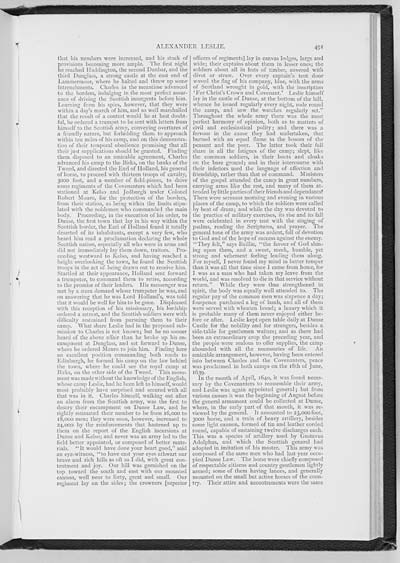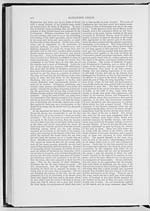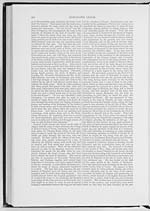491
that his numbers were increased, and his stock of
provisions becoming more ample. The first night
he reached Haddington, the second Dunbar, and the
third Dunglass, a strong castle at the east end of
Lammermoor, where he halted and threw up some
intrenchments. Charles in the meantime advanced
to the borders, indulging in the most perfect assur-
ance of driving the Scottish insurgents before him.
Learning from his spies, however, that they were
within a day's march of him, and so well marshalled
that the result of a contest would be at best doubt-
ful, he ordered a trumpet to be sent with letters from
himself to the Scottish army, conveying overtures of
a friendly nature, but forbidding them to approach
within ten miles of his camp, and on this demonstra-
tion of their temporal obedience promising that all
their just supplications should be granted. Finding
them disposed to an amicable agreement, Charles
advanced his camp to the Birks, on the banks of the
Tweed, and directed the Earl of Holland, his general
of horse, to proceed with thirteen troops of cavalry,
3000 foot, and a number of field-pieces, to drive
some regiments of the Covenanters which had been
stationed at Kelso and Jedburgh under Colonel
Robert Monro, for the protection of the borders,
from their station, as being within the limits stipu-
lated with the noblemen who commanded the main
body. Proceeding, in the execution of his order, to
Dunse, the first town that lay in his way within the
Scottish border, the Earl of Holland found it totally
deserted of its inhabitants, except a very few, who
heard him read a proclamation declaring the whole
Scottish nation, especially all who were in arms and
did not immediately lay them down, traitors. Pro-
ceeding westward to Kelso, and having reached a
height overlooking the town, he found the Scottish
troops in the act of being drawn out to receive him.
Startled at their appearance, Holland sent forward
a trumpeter, to command them to retire, according
to the promise of their leaders. His messenger was
met by a stern demand whose trumpeter he was, and
on answering that he was Lord Holland's, was told
that it would be well for him to be gone. Displeased
with this reception of his missionary, his lordship
ordered a retreat, and the Scottish soldiers were with
difficulty restrained from pursuing them to their
camp. What share Leslie had in the proposed sub-
mission to Charles is not known; but he no sooner
heard of the above affair than he broke up his en-
campment at Dunglass, and set forward to Dunse,
where he ordered Monro to join him. Finding here
an excellent position commanding both roads to
Edinburgh, he formed his camp on the law behind
the town, where he could see the royal camp at
Birks, on the other side of the Tweed. This move-
ment was made without the knowledge of the English,
whose camp Leslie, had he been left to himself, would
most probably have surprised and secured with all
that was in it. Charles himself, walking out after
an alarm from the Scottish army, was the first to
descry their encampment on Dunse Law, and he
rightly estimated their number to be from 16,000 to
18,000 men; they were soon, however, increased to
24,000 by the reinforcements that hastened up to
them on the report of the English incursions at
Dunse and Kelso; and never was an army led to the
field better appointed, or composed of better mate-
rials. "It would have done your heart good," said
an eye-witness, "to have cast your eyes athwart our
brave and rich hills as oft as I did, with great con-
tentment and joy. Our hill was garnished on the
top toward the south and east with our mounted
cannon, well near to forty, great and small. Our
regiment lay on the sides; the crowners [superior
officers of regiments] lay in canvas lodges, large and
wide; their captains about them in lesser ones; the
soldiers about all in huts of timber, covered with
divot or straw. Over every captain's tent door
waved the flag of his company, blue, with the arms
of Scotland wrought in gold, with the inscription
'For Christ's Crown and Covenant.' Leslie himself
lay in the castle of Dunse, at the bottom of the hill,
whence he issued regularly every night, rode round
the camp, and saw the watches regularly set."
Throughout the whole army there was the most
perfect harmony of opinion, both as to matters of
civil and ecclesiastical polity; and there was a
fervour in the cause they had undertaken, that
burned with an equal flame in the bosom of the
peasant and the peer. The latter took their full
share in all the fatigues of the camp; slept, like
the common soldiers, in their boots and cloaks
on the bare ground; and in their intercourse with
their inferiors used the language of affection and
friendship, rather than that of command. Ministers
of the gospel attended the camp in great numbers,
carrying arms like the rest, and many of them at-
tended by little parties of their friends and dependants.
There were sermons morning and evening in various
places of the camp, to which the soldiers were called
by beat of drum; and while the day was devoted to
the practice of military exercises, its rise and its fall
were celebrated in every tent with the singing of
psalms, reading the Scriptures, and prayer. The
general tone of the army was ardent, full of devotion
to God and of the hope of success against the enemy.
"They felt," says Baillie, "the favour of God shin-
ing upon them, and a sweet, meek, humble, yet
strong and vehement feeling leading them along.
For myself, I never found my mind in better temper
than it was all that time since I came from home, for
I was as a man who had taken my leave from the
world, and was resolved to die in that service without
return." While they were thus strengthened in
spirit, the body was equally well attended to. The
regular pay of the common men was sixpence a day;
fourpence purchased a leg of lamb, and all of them
were served with wheaten bread; a luxury which it
is probable many of them never enjoyed either be-
fore or after. Leslie kept open table daily at Dunse
Castle for the nobility and for strangers, besides a
side-table for gentlemen waiters; and as there had
been an extraordinary crop the preceding year, and
the people were zealous to offer supplies, the camp
abounded with all the necessaries of life. An
amicable arrangement, however, having been entered
into between Charles and the Covenanters, peace
was proclaimed in both camps on the 18th of June,
1639.
In the month of April, 1640, it was found neces-
sary by the Covenanters to reassemble their army,
and Leslie was again appointed general; but from
various causes it was the beginning of August before
the general armament could be collected at Dunse,
where, in the early part of that month, it was re-
viewed by the general. It amounted to 23,000 foot,
3000 horse, and a train of heavy artillery, besides
some light cannon, formed of tin and leather corded
round, capable of sustaining twelve discharges each.
This was a species of artillery used by Gustavus
Adolphus, and which the Scottish general had
adopted in imitation of his master. This army was
composed of the same men who had last year occu-
pied Dunse Law. The horse were chiefly composed
of respectable citizens and country gentlemen lightly
armed; some of them having lances, and generally
mounted on the small but active horses of the coun-
try. Their attire and accoutrements were the same

![]() Universal Viewer |
Universal Viewer | ![]() Mirador |
Large image | Transcription
Mirador |
Large image | Transcription
![]()

